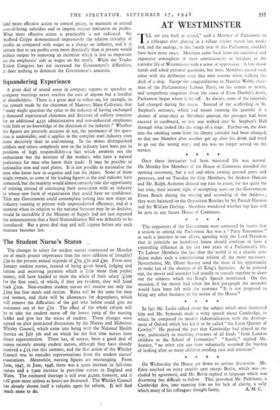AT WESTMINSTER
-i'LL see you back at school," said a Member of Parliament to I a colleague after playing in a village cricket match last week- end, and the analogy, in this fourth year of this Parliament, couldn't have been more exact. Members came back from the uncritical and expansiye atmosphere of their constituencies or holidays to the corridor life of Westminster with a sense of oppression. A few shook hands and asked personal questions, but most Members passed each other with the deliberate stare that men assume when walking the deck of a ship. Except for congratulations to Maurice Webb, chair- man of the Parliamentary Labour Party, on his return to health, and sympathetic enquiries about the cause of Evan Durbin's death, Parliament began where it left off. As always, some of the externals had changed during the recess. Instead of the scaffolding in St. Stephen's entrance, which had meant running the gauntlet of a shower of stone-dust as Members entered, the passages had been encased in cardboard, so that one walked into St. Stephen's Hall through what looked like the wings of a stage. Further on, the door into the smoking room from the library corridor had been changed, so that one Member after another got up after his drink and tried to go out the wrong way ; and tea was no longer served on the terrace.
* * * * Once these intricacies had been mastered life was normal On Monday few Members of the House of Commons attended the opening ceremony, but a red and white awning greeted peers and peeresses, and on Tuesday the City Members, Sir Andrew Duncan and Mr. Ralph Assheton donned top hats to assert, for not quite the last time, their ancient right of occupying seats on the Government Front Bench during the moving and seconding of the Address ; they were balanced on the Opposition Benches by Sir Patrick Harmon and Sir William Darling. Members wondered whether top hats will be seen in any future House of Commons.
* *
The supporters of the Government were unmoved by taunts that a session to amend the Parliament Act was a "Party Pantomime" at such a juncture in our affairs, agreeing with the Lord President that in principle no hereditary house should continue to have a controlling influence in the last two years of a Parliament's life. To Labour Members the fact that the world is in a chaotic con- dition makes such a constitutional reform all the more necessary. Nevertheless, Mr. Oliver Stanley used the most of his opportunity to make fun of the shortest of all King's Speeches. As he pointed out, the mover and seconder had usually to consult together to share out the subjects which the King's Speech mentioned. On this occasion, if the mover had taken the first paragraph the seconder would have been left with the sentence "It is not proposed to bring any other business to the notice of the House."
* * *
In fact Mr. Leslie talked about the subject which most interested him and Mr. Symonds made a witty speech about Cambridge, in which he compared its modest industrialisation with the develop- ment of Oxford which has led it to be called "the Latin Quarter of Cowley." He praised the part that Cambridge had played in the war, particularly in receiving evacuees of all kinds "from London children to the School of Economics." "Surely," replied Mr. Stanley, "no other city can have voluntarily assumed the burden of looking after so many children needing care and attention."
* * * * On Wednesday the House got down to serious discussion. Mr. Eden touched on every trouble spot except Berlin, which was ex- cluded by agreement, and Mr. Bevin replied in language which was disarming but difficult to follow. This provoked Mr. Pickthorn, a Cambridge don, into taunting him on his lack of clarity, a sally
which many of his colleagues thought funny. A. M. C.


































 Previous page
Previous page